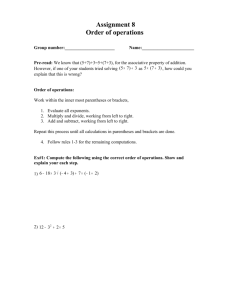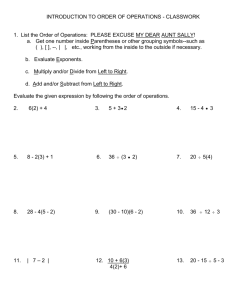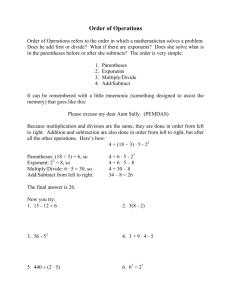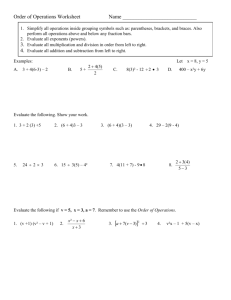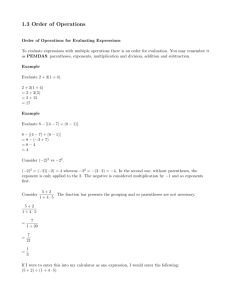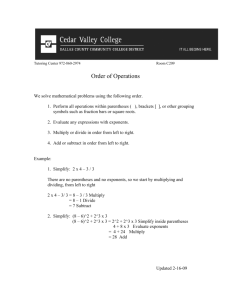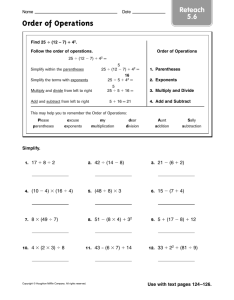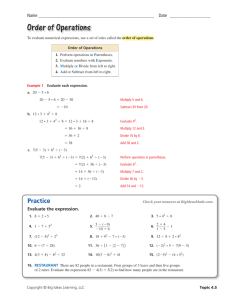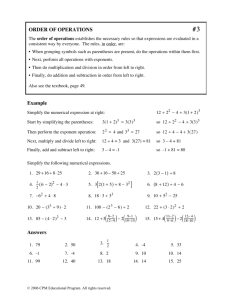Document
advertisement
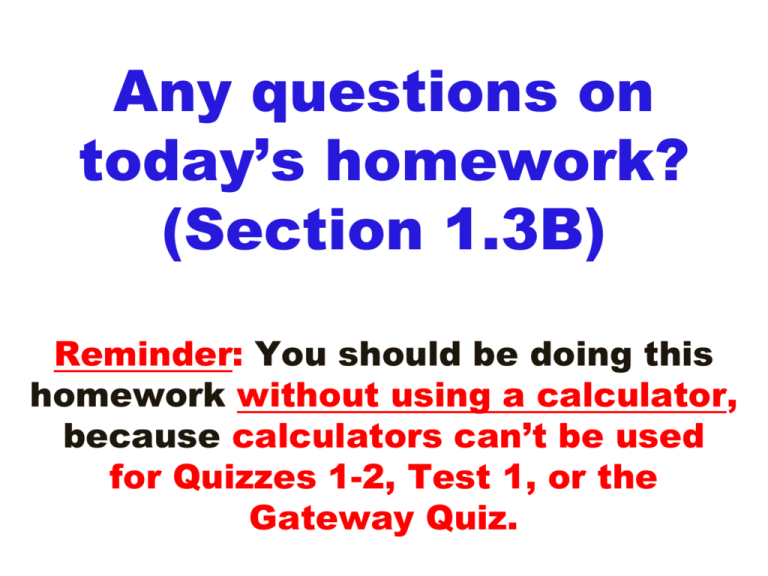
Any questions on today’s homework? (Section 1.3B) Reminder: You should be doing this homework without using a calculator, because calculators can’t be used for Quizzes 1-2, Test 1, or the Gateway Quiz. HOMEWORK REMINDERS: • Today’s homework assignment on Sections 1.4 and 1.5 is due at the start of our next class session. • There is also a Gateway homework assignment (Gateway HW #1) due next class session. This homework has a required paper worksheet (which will be handed out in class by the TAs now.) NOW CLOSE YOUR LAPTOPS (You may reopen them when I finish the lecture, at which time you can start this homework assignment. If there’s not time to work on it during class, you’re welcome to stay and work on it in the open lab next door.)) Section 1.5: Working with positive and negative signs A number line is a line on which each point is associated with a number. –5 –4 –3 –2 –1 Negative numbers 0 1 2 3 4 Positive numbers 5 To add two numbers, especially if one (or both) of them is negative, it often helps to picture them on a number line. Example 1 : 3 + (-5) •Locate the first number on the number line. • Starting from that number, if the second number is positive, move to the right by that many units. If it’s negative, move to the left that many units. (-5) 3 (Count 5 units to the left from 3) –5 –4 –3 –2 –1 Answer is: -2 0 1 2 3 4 5 Example 2: -2 + (-3) •Locate the first number on the number line. • Start from that first number. The second number is negative, so move to the left by that many units. (-3) 2 (Count 3 units to the left from -2) –5 –4 –3 Answer is: -5 –2 –1 0 1 2 3 4 5 Example 3: -2 + 6 •Locate the first number on the number line. • Start from that first number. The second number is positive, so move to the right by that many units. +6 2 (Count 6 units to the right from -2) –5 –4 –3 –2 –1 0 1 2 3 4 5 Answer is: 4 Note: We have handouts of number line worksheets for you to use on your homework and during tests and quizzes. TAs will now hand out copies for you to keep in your notebook for homework use, and clean copies will be handed out for you to use on tests and quizzes. Example from today’s homework: Answer: 1.6 Example from today’s homework: Answer: -14 Section 1.4: Order of Operations 32 is a number written in exponential notation • Base is 3 • Exponent is 2 • The notation means 3 • 3 Example Evaluate 32. Answer: 32 = 3 • 3 = 9 Example Evaluate 23. 23 = 2 • 2 • 2 =2•2•2 =4•2 =8 Example from today’s homework: Answer: 25 Example from today’s homework: Answer: 16/49 NOTE: Many of today’s homework problems as well as Gateway problems 7 & 8 all require using the order of operations. Order of operations: 1) First, calculate expressions within grouping symbols (parentheses, brackets, braces). If there are nested sets of grouping symbols, start with the innermost ones first and work your way out. 2) 3) 4) Exponential expressions – left to right Multiplication and division – left to right Addition and subtraction – left to right 15 Order of operations memory device: “Please excuse my dear Aunt Sally” 1. Please 2. Excuse 3. My Dear 4. Aunt Sally (Parentheses) (Exponents) (Multiply and Divide) (Add and Subtract) … or just remember PEMDAS 16 Example Simplify the following expressions. 6 2 2 2 6 2 2 32 6 4 32 2 32 34 5 3 18 3 6(8 5) 3 6(3) 21 3 7 7 2 16 2 18 4 2 16 2 36 6 Example from today’s homework: Answer: 156 Sample Gateway Problem # 7: Strategy: Calculate out the entire top expression and then the entire bottom expression, using the order of operations on each part. Then simplify the resulting fraction, if necessary. TOP EXPRESSION: 24 – 4(7 + 2) Step 1: Parentheses: 24 – 4(7 + 2) = 24 – 4(9) Step 2: Exponents: 24 – 4(9) = 2•2•2•2 – 4(9) = 16 – 4(9) (because 2•2•2•2 = 4•2•2 = 8•2 = 16) Step 3: Multiply/Divide: 16 – 4(9) = 16 – 4•9 = 16 – 36 Step 4: Add/Subtract: 16 – 36 = -20 19 Now calculate the bottom expression: 2(6+2) + 4 Step 1: Parentheses: 2(6+2) + 4 = 2(8) + 4 Step 2: Exponents: There aren’t any in this part. Step 3: Multiply/Divide: 2(8) + 4 = 2•8 + 4 = 16 + 4 Step 4: Add/Subtract: 16 + 4 = 20 Now put the top over the bottom and simplify the resulting fraction: TOP = 24 – 4(7 + 2) = -20 = -1 = -1 BOTTOM 2(6+2) + 4 20 1 20 Full Solution to Sample Problem #7: Here is the work we expect to see on your quiz worksheet: 24 – 4(7 + 2) = 24 – 4(9) = 16 – 4(9) = 16 – 36 = -20 = -1 = -1 2(6+2) + 4 2(8) + 4 16 + 4 20 20 1 21 Sample Gateway Problem # 8: Strategy: Deal with the expressions inside the grouping symbols (parentheses, brackets) first, starting with the innermost set (-3 + 6). STEP 1: (inside the parentheses) 3[17 + 5(-3 + 6) - 10] = 3[17 + 5(3) - 10] STEP 2: (inside the brackets; multiply first, then add and subtract) 3[17 + 5(3) -10] = 3[17 + 5•3 -10] = 3[17 + 15 - 10] = 3[17 + 15 - 10] = 3[32 - 10] = 3[22] STEP 3: Do the final multiplication: 3[22] = 3•22 = 66 22 Full Solution to Sample Problem #8: Here is the work we expect to see on your quiz worksheet: 3[17 + 5(-3 + 6) - 10] = 3[17 + 5(3) - 10] = 3[17 + 15 - 10] = 3[32 - 10] = 3[22] = 66 23 A variable is a symbol used to represent a number. An algebraic expression is a collection of numbers, variables, operations, grouping symbols, but NO equal signs (=) or inequalities (< , > , ≤ , ≥ ) We can evaluate an algebraic expression by assigning specific values to any variables that might be in the expression. Example Evaluate 3x2 – 2y + 5 when x = 2 and y = 4. 3(2)2 – 2(4) + 5 = 3·4 – 8 + 5 = 12 – 8 + 5 = 9 Example from today’s homework: Answer: 15 An algebraic equation is a statement that two expressions have equal value. Example of an equation: 2x – 4 = 5 - x A solution to an equation is a number that you can substitute in place of the variable that makes both sides of the equation come out to the same answer. Example: The number 3 is a solution of the equation 2x – 4 = 5 – x. We show this by replacing all x’s with 3’s, then calculating each side: The two sides are equal, so 3 2∙x – 4 = 2∙3 – 4 = 6 – 4 = 2 is a solution of 5–x=5–3=2 2x – 4 = 5 – x. Example from today’s homework: Answer: no REMEMBER: Come to the open lab if you need help. There are more than 40 open lab hours each week. Lab hours: Mondays through Thursdays 8:00 a.m. to 6:30 p.m. All of our teaching assistants have lots of experience teaching Gateway problems and the other problems in your HW assignments. You may now OPEN your LAPTOPS and begin working on the homework assignment. This assignment is due at the start of our next class session.
